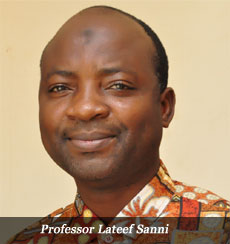Last Updated on August 27, 2015 by FUNAAB

The University, in collaboration with the National Resources Institute (NRI), United Kingdom, have reeled out the benefits of their two decades of partnership and development initiatives, which began in 1995.
Speaking at the Natural Resources Institute, Greenwich University, Kent in the United Kingdom, the Dean, College of Food Science and Human Ecology (COLFHEC), Professor Lateef Sanni, re-iterated the tripodal mandates of Teaching, Research and Extension on which the University was established. Professor Sanni, who is currently the President, International Society for Root Crops, Africa Branch disclosed the essence of fufu drying, stating that fermented cassava product in wet form was highly perishable. Professor Sanni, who is the Country Manager of the Project, Cassava: Adding Value for Africa (CAVA II), stated that organic acids produced during fermentation remained the sources of the odour in fufu, causing a reduction in acidity and increased Potential for Hydrogen (PH) values.
According to him, “Drying generally resulted in major losses of volatile gases. Butanoic acid reduced from 46.61µg/g dry matter of fufu to between 0.01 and 0.12 µg/g dry matter of fufu at the end of the drying process”. He noted that the study showed the adequacy of controlled drying, as a good method of reducing the suspected volatile components responsible for the offensive odour in fufu, stressing that the sensory acceptability of dried and wet fufu were conducted, in which significant differences were observed.
Professor Sanni highlighted other benefits to include increase in farmer income and employment opportunities, adding that intermediaries such as the private sector, would enjoy the benefits of more business opportunities in fufu flour. He stated further that the end-users would get increased profitability and lower consumer prices, while nationally, it would provide a platform for reduced imports. On CAVA II, he said the project sought to increase the income of smallholder farmers and community processors, through participation in profitable and sustainable value-added cassava chains in five African countries, namely: Nigeria, Ghana, Tanzania, Uganda and Malawi, as “CAVA II is facilitating investments in the cassava processing or utilisation sectors in each project country”. He mentioned other future areas of collaboration to be the sustenance of the two decades of research partnerships, as well as regional capacity strengthening for equipment fabricators and food regulators, adding that Joint Academic Programmes in Food Safety and Value Addition would enhance such partnership. Professor Sanni also disclosed that the Joint International Conference on Food Science and Human Ecology, is to be hosted by FUNAAB in July 2016, adding that the Regional Food Safety and Nutrition Training Workshops would also be part of the future areas of collaboration for both institutions.
